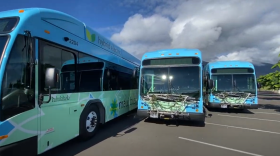Kauai and Maui are encouraging trans-Pacific travelers to take a free, second COVID-19 test a few days after they arrive on the islands. It’s as an extra precaution to stem the spread of the virus -- but few are taking up the offer.
The state opened up to tourism on Oct. 15 with a program that allows passengers who take a negative pre-flight test to avoid the 14-day mandatory travel quarantine.
Because there is a chance that those who take the pre-travel test can still be positive when they arrive, Maui and Kauai set up voluntary second tests.
Maui wants travelers who took the pre-travel test and avoided quarantine to take a second one a few days after arriving in the county.
Between Oct. 17 and Nov. 2, the county reported about 1,400 people took the second test. That is less than 1 percent of the nearly 20,000 travelers who arrived in Maui since the pre-travel test program began.
Kauai has a program like Maui’s and is seeing a similar low percentage of people taking the voluntary test.
In each county, three of the secondary tests have come back positive.
While Maui would provide no further information, Kauai’s district health officer, Dr. Janet Berreman, said more residents are taking the second test compared to tourists.
"We're testing about 20% of the returning residents, and only around 2% of visitors. But what we are seeing in terms of the effect of the free travel program is that although it provides a level of protection, it's not 100%," she said.
Since travel reopened, Kauai has seen an uptick in COVID cases.
There have been about a dozen new infections since Oct. 15. That doesn’t seem like much, but Berreman says it’s significant since the county had up to then under 60 cases for the entire pandemic.
"Those [recent cases] are all related to travel, either directly or indirectly. And by indirectly, I mean household members or traveling companions with people who've traveled," she said. "At this point, the level of disease activity that we're seeing is manageable. But we're a small island, and we do have limited resources. So I would say that we are following closely and with some sense of caution."
The state is also running a surveillance testing program that randomly samples arriving passengers who participated in the pre-travel test program.
Tim Brown, an infectious disease expert at the East-West Center, said the surveillance numbers he’s seen so far indicate few arrivals are testing positive.
However, he says a second test could be avoided if everyone just did one thing: put on a mask.
"If the tourists are all wearing masks in Waikiki, then we don't need the second test," he said.
He joined other health experts who have called for a clear statewide mask mandate.
"If you're in public, you're wearing a mask, period. That should be the masking mandate in Hawaii, not these wishy washy things you have now," he said. "All of that makes it very difficult to enforce. It also encourages people to find excuses not to wear a mask, and, quite frankly, the number one public health intervention we have for COVID right now, is a mask. If everybody here wore a mask , you would stop this epidemic in its tracks."
He says because tests only measure whether one is infectious at that moment, it is not a reliable way to protect people from spreading COVID-19.
Berreman says it’s been only a few weeks since the pre-travel test program began, so it’s still too soon to gauge its success.
"It's really challenging. We also know that if we do see a large spike in diseases, then we likely will be going back to more restrictions, and that will again have an economic impact," she said. "I don't think any of us knows yet perfectly how to strike the right balance."
She said the next two to three weeks will be critical in seeing just how many more cases develop.




